Key takeaways:
- Biodegradable cleaners break down naturally, using plant-based ingredients, and significantly reduce health risks from harsh chemicals.
- Choosing biodegradable cleaners supports sustainable living by minimizing environmental impact and pollution while maintaining cleaning effectiveness.
- DIY recipes for biodegradable cleaners can be made from simple household ingredients, enhancing both cleaning efficacy and sensory experience.
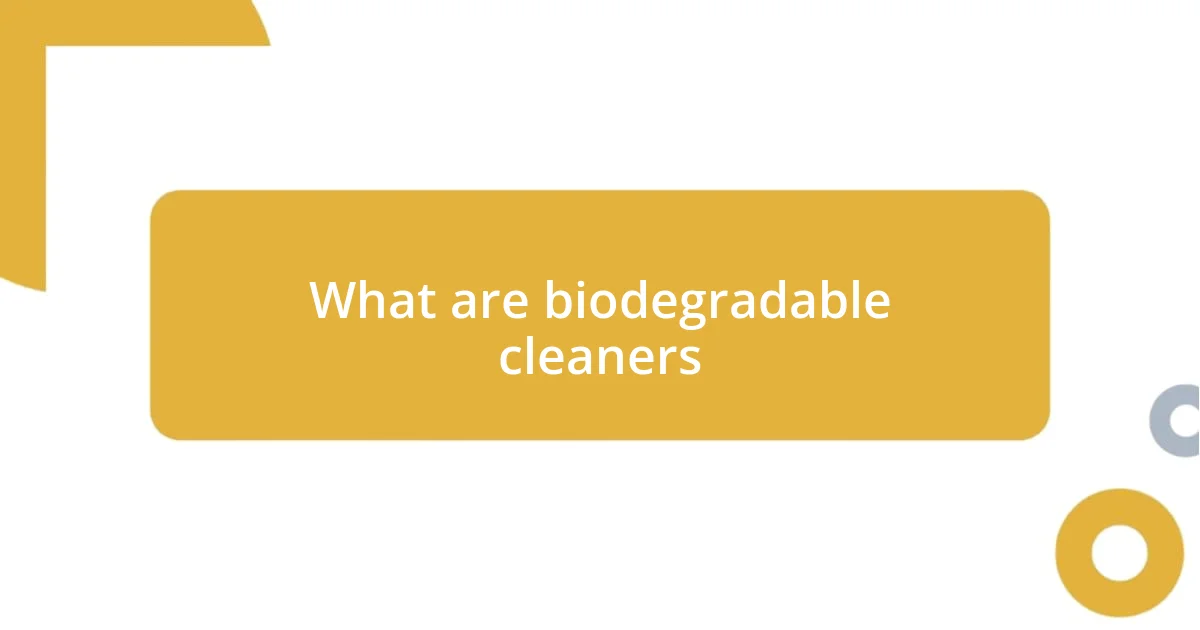
What are biodegradable cleaners
Biodegradable cleaners are cleaning products designed to break down naturally over time without causing harm to the environment. They typically contain plant-based ingredients that decompose, leaving no toxic residue behind. I remember the first time I switched to biodegradable cleaners; it felt like I was finally making a small yet significant step toward a more sustainable lifestyle.
What truly fascinates me is how these cleaners often harness the power of nature. For instance, many use enzymes or microorganisms to break down dirt and grime effectively. Have you ever noticed how much fresher your home smells after using these products, compared to their chemical-laden counterparts? That subtle hint of natural scent always brings me a sense of peace, knowing I’m avoiding harsh chemicals.
In my experience, choosing biodegradable cleaners is not just about being eco-friendly; it’s also about personal health. I’ve found that switching to products free from harsh chemicals reduces headaches and irritations that I used to experience. It really makes you think—why wouldn’t we opt for something that’s safe for our families and the planet?
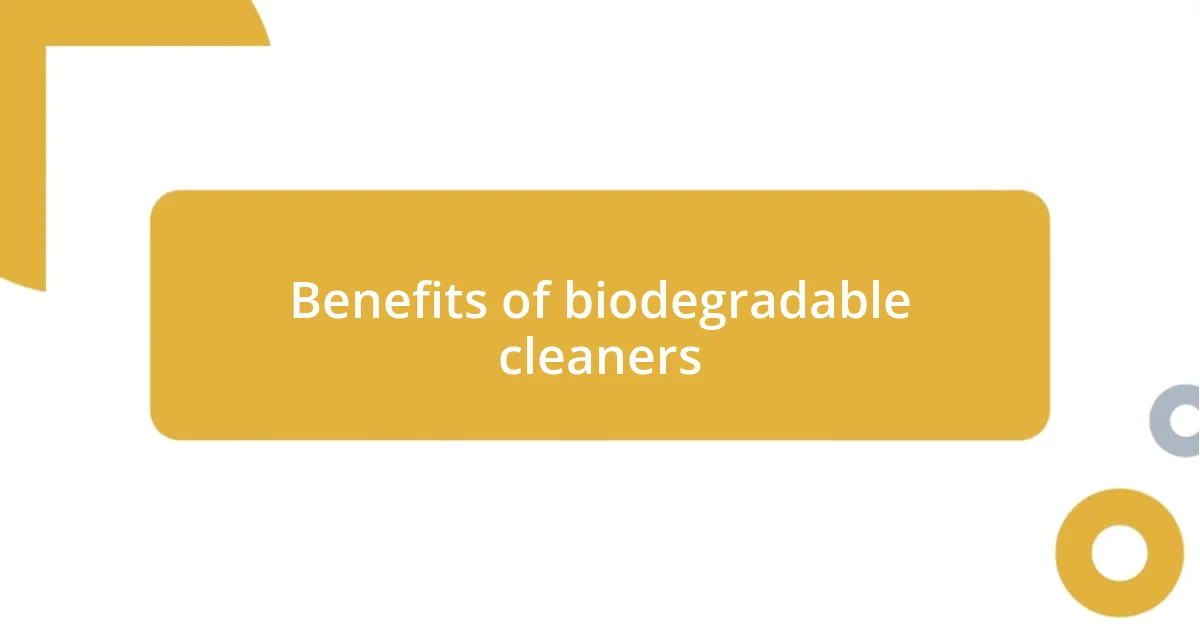
Benefits of biodegradable cleaners
When I started using biodegradable cleaners, I noticed a significant drop in the number of allergic reactions in my family. The shift to natural ingredients was refreshing, not just for the environment, but for our health too. Less irritation and fewer harmful fumes made cleaning almost enjoyable, rather than a chore I dreaded.
Another compelling benefit is how biodegradable cleaners contribute to sustainable living. They’re designed to break down into harmless substances after use, which means I’m not just cleaning my home; I’m also ensuring I’m leaving a lighter footprint on our planet. Every time I clean, I feel like I’m doing my small part to combat pollution, and that empowerment makes each scrub and wipe a meaningful task.
Moreover, the effectiveness of these cleaners often rivals traditional products. I’ve tested various brands and found that many biodegradable solutions tackle tough stains just as well, if not better, than their chemical counterparts. It’s a win-win situation: sparkling clean surfaces and peace of mind knowing I’m supporting a healthier environment.
| Biodegradable Cleaners | Traditional Cleaners |
|---|---|
| Eco-friendly | Potentially harmful to the environment |
| Less irritation for sensitive individuals | May cause allergic reactions |
| Break down naturally | Can leave toxic residues |
| Often use plant-based ingredients | Commonly contain harsh chemicals |
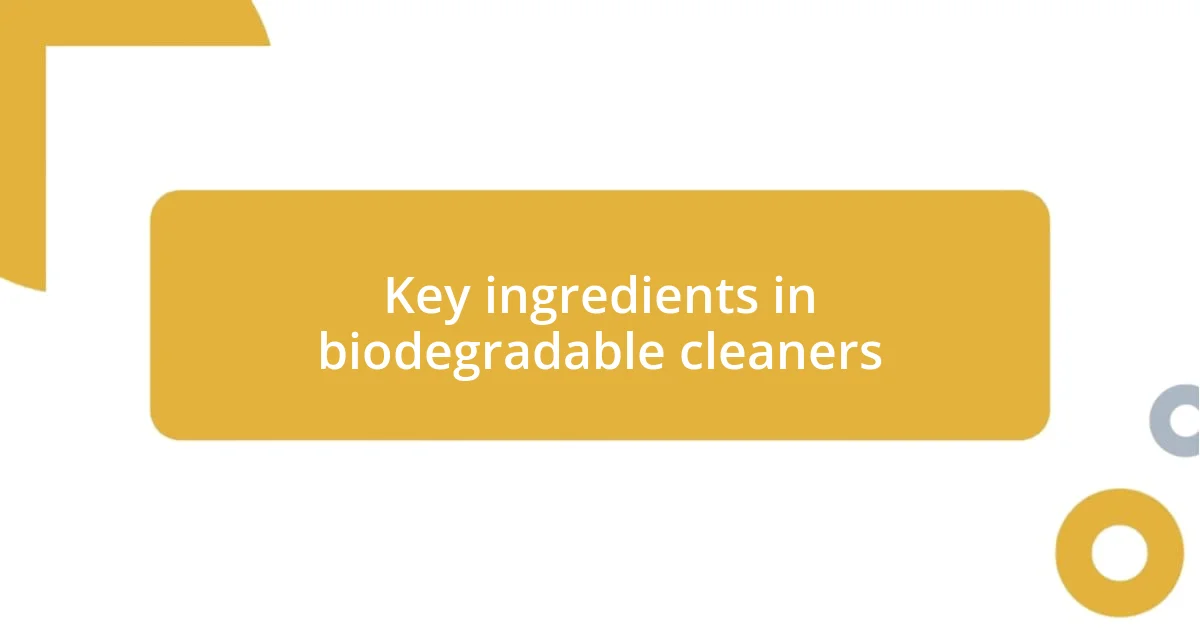
Key ingredients in biodegradable cleaners
When exploring biodegradable cleaners, I’ve found that the key ingredients truly set them apart. They often include natural components like vinegar, baking soda, and essential oils, which not only clean effectively but also provide a wonderful scent that lifts my spirits while I tidy up. I recall a day when I was tackling stubborn grease in the kitchen; the grated lemon I added not only cut through the grime but also filled the space with a bright, uplifting aroma that made the chore feel less tedious.
Here are some common key ingredients you’ll find in biodegradable cleaners:
- Plant-based surfactants: These lift dirt and grease while being gentle on both surfaces and the environment.
- Vinegar: A natural disinfectant that reduces bacteria, while also neutralizing odors.
- Baking soda: Acts as a natural abrasive and deodorizer, helping to scrub away tough stains.
- Essential oils: Provide a fresh scent and often carry their own antibacterial and antifungal properties.
- Coconut oil: Used for its antimicrobial properties, it’s perfect for a deeper clean without harmful residues.
Each time I use these ingredients, I’m reminded of how well they perform while being kind to the planet. Just the other day, I was amazed at how well the vinegar tackled soap scum in my bathroom. It’s astonishing to realize that cleaning can be both effective and environmentally conscious.
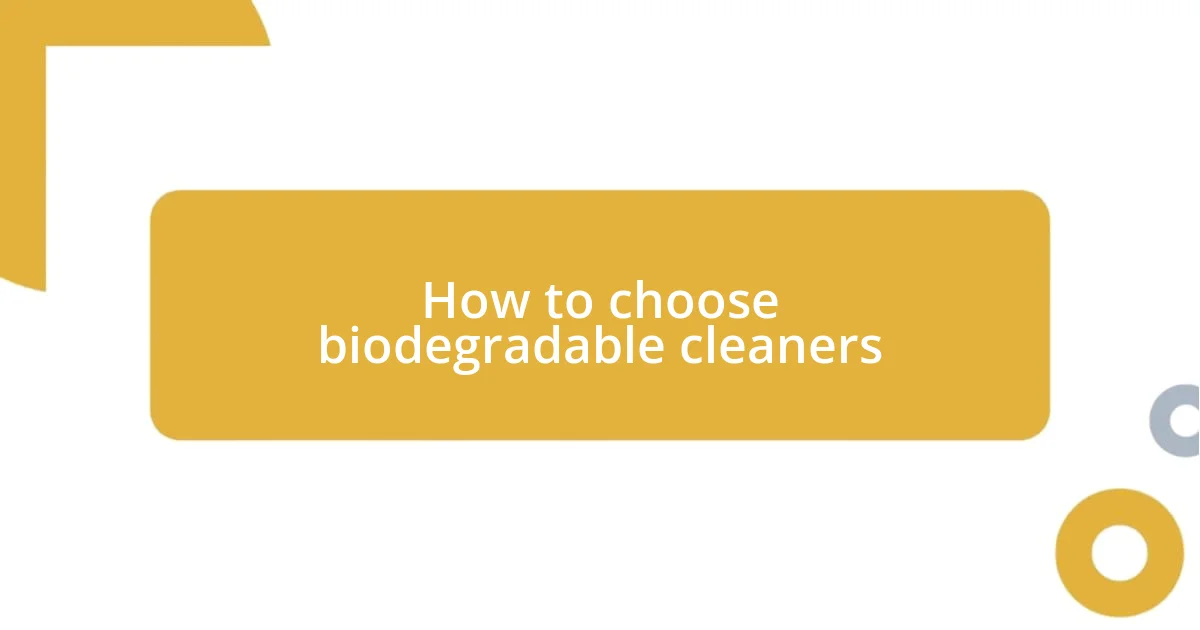
How to choose biodegradable cleaners
When it comes to choosing biodegradable cleaners, I always start by looking for certifications. Brands that are transparent about their ingredients and hold eco-certifications tend to reflect a genuine commitment to sustainability. I remember stumbling upon a cleaner that proudly displayed its “Green Seal” certification; using it gave me an instant feeling of trust. Have you ever wondered if the product you’re using is really as environmentally friendly as it claims?
Beyond certifications, I pay attention to ingredient lists. The simpler, the better! I’ve noticed that products with a shorter list of recognizable components often perform just as well, if not better, than those loaded with chemicals. For instance, I once chose a cleaner made primarily with citric acid and plant oils, and it worked wonders on my countertops. This made me realize that sometimes, the old-fashioned ingredients really are the best.
Lastly, considering scent is essential for me. I gravitate toward cleaners infused with natural fragrances like lavender or eucalyptus. Not only do they elevate my cleaning routine, but they also create a soothing atmosphere in my home. One afternoon, I cleaned my living room with a eucalyptus-based cleaner, and the refreshing aroma lingered for hours, turning mundane chores into a delightful experience. What scents inspire you when you clean?
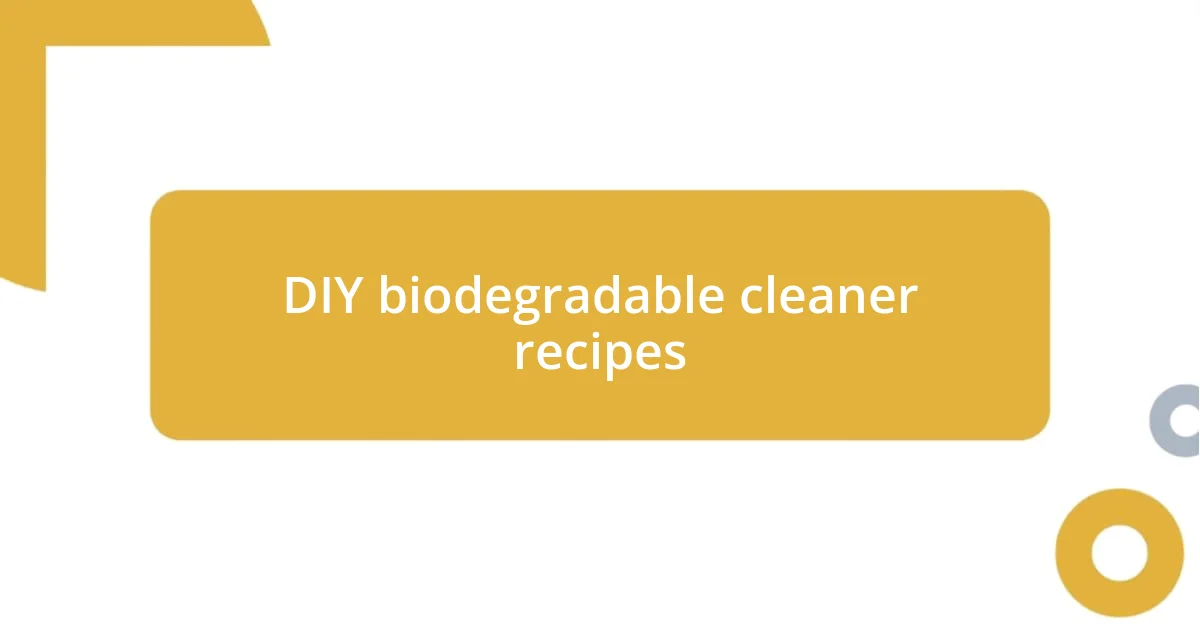
DIY biodegradable cleaner recipes
Creating your own biodegradable cleaners can be both fun and rewarding. One of my favorite recipes combines equal parts vinegar and water in a spray bottle, with a few drops of tea tree oil added for its antibacterial properties. I remember the first time I used this mixture; it not only left my countertops sparkling but also filled my kitchen with a fresh, natural scent that made the whole space feel alive.
Another great recipe involves mixing baking soda with a bit of coconut oil to form a paste. This concoction works wonders on stubborn stains, and I’ve used it successfully on everything from dirty dishes to baked-on messes in my oven. I still chuckle when I think about the time I tackled a particularly tough spill and felt like a cleaning superhero, armed with nothing but a simple blend of pantry staples!
For a delightful all-purpose cleaner, try blending one cup of distilled water, one cup of vinegar, and a tablespoon of lemon juice. As I mixed this up in my kitchen, I was surprised at how refreshing the citrus scent was while still being powerful enough to disinfect surfaces. Isn’t it fascinating how these simple ingredients can transform mundane cleaning tasks into an enjoyable sensory experience?
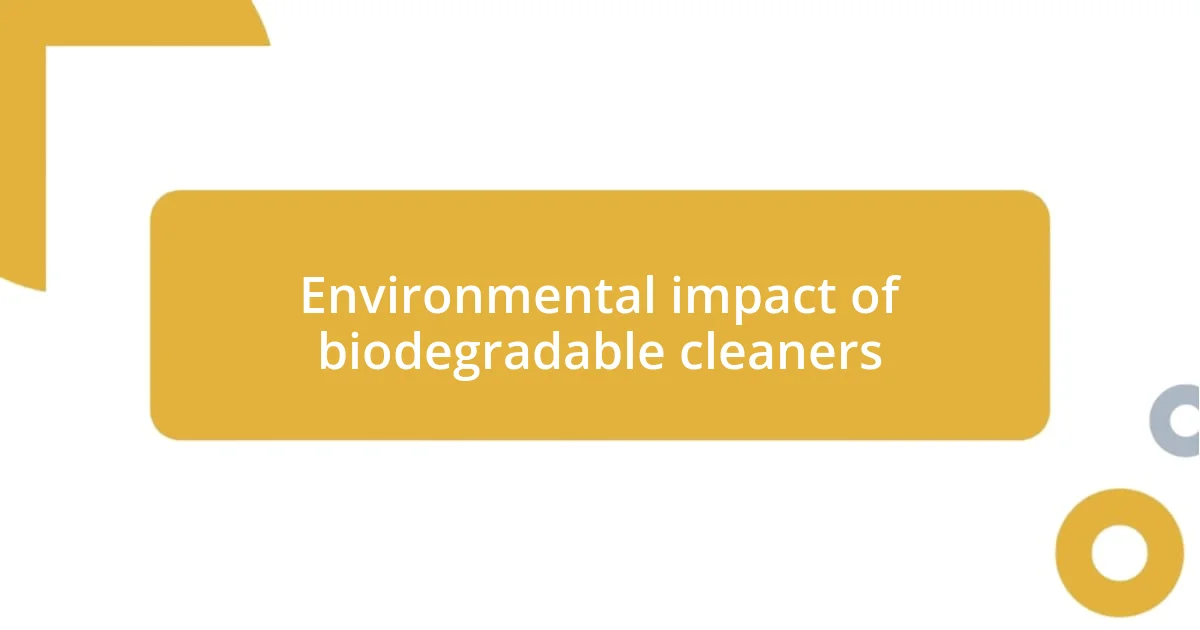
Environmental impact of biodegradable cleaners
When I think about the environmental impact of biodegradable cleaners, I’m often reminded of how they break down more easily than traditional cleaners. This reduces the risk of harmful chemicals leaching into our soil and waterways. It makes me feel good knowing that when I use these products, I’m contributing to a healthier planet rather than adding to pollution.
One experience that drives this point home was when I volunteered for a local cleanup initiative. During that event, we discovered a section of our river filled with debris from commercial cleaners. It was shocking to see the impact of those products on local wildlife. In contrast, I was able to reflect on my choices at home and feel proud that I wasn’t contributing to that problem by opting for biodegradable alternatives.
Moreover, I’ve also learned that biodegradable cleaners often come with a lower carbon footprint due to their natural ingredients. This realization struck me while chatting with a friend who works in sustainability; it gave me a deeper appreciation for the power of my purchasing choices. Have you thought about how your cleaning products align with your ecological values? Each small decision can make a significant difference.















